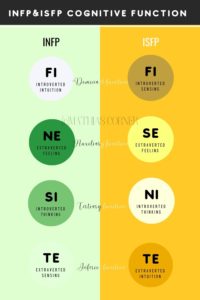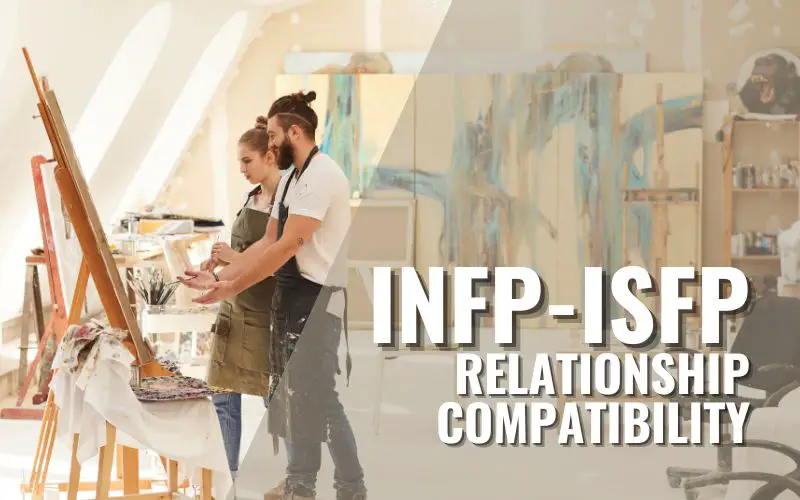If you’re someone in an INFP-ISFP romantic relationship, then it would be evident to you that both have strong personal values, the urge to be authentic, and creativity. Both are passionate and caring about the people in their lives and can be deeply committed to the relationships they form.
As with any relationship, specific challenges may arise when an INFP and ISFP come together. So how do these relationships generally go?
Do INFP and ISFP relationships work? Let’s talk about it.
Do INFPs and ISFPs get along?
In terms of creativity, passion, and sensitivity, INFPs and ISFPs can agree a whole lot.
But while friendships between INFP and ISFP are often filled with fun and sensitivity, being a couple may be a different story. It can work, but remember that it is not without struggles, especially in terms of their significant differences.
Being both Fi-dominants, INFPs and ISFPs carry a strong set of their own values. While both being “moral” sounds like a good tandem, it may not be as sweet as people think, especially when those morals clash.

ISFP leans on the physical (Se), the INFP on the idealistic realm (Ne). If immature, INFP and ISFP can be stubborn about their beliefs, and unable to compromise.
However, it doesn’t mean that this relationship is doomed from the start. This can work if you and your partner constantly communicate. You need to have a conscious effort to talk things out.
On a brighter note, ISFPs and INFPs are drawn to each other for different reasons.
ISFPs are attracted to the INFPs‘ depth, individuality, and creativity. They adore how INFPs are down-to-earth and sincere. On the other hand, INFPs love ISFPs’ present nature, quiet confidence, and kindness. They love how ISFPs appear laidback and sensitive but are actually tough, too.
So do INFP-ISFP relationships get along?
As friends, they can easily get along with each other well, especially when it comes to creativity and passion. But as companions, INFP-ISFP relationships may struggle to compromise their values and may lead to misunderstandings. But with an effort to comprehend each other’s motivations, this match can work out.
INFP-ISFP Compatibility: The Strengths
An INFP-ISFP relationship is rare but can be extremely fulfilling and rewarding. Take time to appreciate these advantages and strengths of your relationship.
1. Their creativity makes the relationship fun and colorful.
INFP and ISFP relationships have chemistry, especially when they land on common hobbies and interests.
The ISFP leans on a more physical sense of creativity, like handcrafts, collecting, and attending events that cater to their creativity. Meanwhile, INFPs lean on more intuitive creativity where they use their imagination, such as writing, reading, and video animations.
ISFPs are passionate about their creative undertakings. INFPs, too. This gives them common ground, an aspect their relationship never gets tired of.
They can use their creativity to venture into new and unusual endeavors, bond together, and satisfy their emotions. Such passion can be one of the centerfolds of being in an INFP-ISFP relationship.
2. Mutual respect for alone time.
As both introverts, they know how to respect each other’s alone time and love coming together with their loved ones in comfortable settings, making them an excellent and socially compatible match.
Being both sensitive and empathetic, they understand how it’s important to be lost in their own dimensions once in a while.
Inserting their creativity, if the ISFP buys pints of paint and makes their garage a creative station, INFPs are fine with that. “Yay! A creative studio!” An INFP agrees.
On the other hand, when an INFP stays in their room and works on a novel, their ISFP partners would occasionally peek, even tease their INFP a little, but are deeply appreciative and proud of their INFP’s creative ventures.
3. They fill where each other lack.
INFPs operate with extraverted intuition (Ne). It means these Dreamers love expanding ideas and options, telling their partner, “there’s another way to do that,” or saying, “we have more options, so relax.”
Since ISFPs dwell in the physical realm, it may wear them down when their surroundings don’t go as planned. This is where an INFP’s strength comes in. In times where ISFPs feel stuck, INFPs’ idealism can feed them a more optimistic perspective.
ISFPs love how INFPs present ideas that feel so adventurous, even just thinking about them.
INFP: Why not do this? (presenting an idea)
ISFP: But that didn’t work. I already worked on that.
INFP: Then you could do this instead. (presenting another idea)
ISFP: Woah, that makes sense!
In the same way, ISFPs operate with Extraverted Sensing (Se), which lives up to their name “Adventurers.” They love experiencing new adventures and planning getaways. So, fortunately, the INFP who never leave their homes are opened to more experiences, thanks to their ISFP partner.
INFPs love learning, and their ISFPs can provide that by bringing INFPs into more experiences.
ISFP: Let’s tour!
INFP: I don’t want to…
Also INFP after the tour: That was ahh-mazing!!!! Let’s go there again!!!
ISFPs are encouraged to explore more options and ideas, and INFPs are urged to explore more places and experiences.
INFP-ISFP relationships desire to satisfy each of their authenticity, but at the same time, they unconsciously inspire their partners, too.
The Struggles of the INFP-ISFP Relationship
On a bad day, the INFP-ISFP relationship can be complicated, too.
To better understand your INFP or ISFP partner, look at these challenging areas of the relationship that you can work on.
1. INFPs love the abstract, while ISFPs are about the physical.
INFPs dwell with the what-ifs, ISFPs with the what-is. Unfortunately, this single difference can cause a major disconnect between the two personalities.
An INFP may feel alone in their imaginative endeavors because their ISFP doesn’t understand or even tries to participate in the abstractions. This disconnect is even more amplified because ISFPs don’t find purpose in dwelling on imaginations and made-up scenarios.
INFPs love projecting their dreams and goals, but because ISFPs are more concerned with what they currently see or have, in some way, ISFP invalidate INFP’s dreams and in a snap, they shut down INFP’s childlike excitement.
An INFP can be more open-minded about ISFP’s goals, while ISFPs are more black-and-white. As someone who values depth and connection, INFPs may perceive this as insensitivity, leading to emotional disconnect.
They will feel like they don’t fit into each other’s worlds.
Unfortunately, intuition is such a wide dimension that can only be grasped by an intuitive, too. If an INFP can’t find a way to express these ideals and dreams, it may result in an INFP feeling caged or unheard.
2. INFP and ISFP may find it hard to compromise.
Both need a partner who can handle their intense emotions without trying to control what they do. Freedom and flexibility. In short, even in a relationship, both can be unwilling to drop their values, and desire freedom to be authentic.
There may come a time when they show no emotional compatibility simply because one may consider themself superior or more correct than the other. This is the problem when two Fi-dominants clash and both are immature.
No one’s willing to give up, and both think the other is wrong. They’d rather withdraw from the fight and still hold to what they believe in rather than drop their pride and compromise.
“Why do you overthink everything?” An ISFP tells to INFP.
“Why are you so close-minded?” An INFP may respond.
They come from different motivations, and both are stubborn about being authentic. If both can’t set healthy boundaries and better communication, this can eventually sever the relationship.
3. Despite being creative, they may have different preferences.
INFP-ISFP relationships understand each other’s love for creativity, and that’s wonderful.
However, let’s remember that they both have different preferences for creativity. For example, in a movie. While an INFP finds a movie mind-boggling, the ISFP finds it practically boring.
On the other hand, what ISFPs find amazing, may not even tickle INFPs’ intuitive minds.
With this, both may feel like two ships passing in the night. They’ll both feel like they’re doing their own thing and not communicating enough with each other’s interests.
They work separately and tend to mind their own business rather than cooperate on a single goal.
4. Structure doesn’t come naturally.
The INFP-ISFP relationship is based on trust, harmony, and understanding. It’s a relationship built on a deep connection to the natural world and relies heavily on flexibility. Unfortunately, the structure doesn’t come naturally for either party in this relationship.
ISFP may often feel frustrated and unheard because, in the first place, an INFP may consider ISFP’s choices flawed, and the ISFP disagrees. In turn, an INFP may feel like their partner doesn’t care enough about making plans together in advance.
This can make both parties feel like they’re failing each other—and so they end up feeling isolated as they try to figure out what went wrong.
INFP-ISFP Relationship Advice
If you and your partner belong to the INFP and ISFP relationship category and struggle to meet eye to eye, consider the following advice.
- You can agree to disagree. If a decision doesn’t answer to each other’s preferences, learn that you can pursue your plans without forcing the other to like them.
- You better learn to compromise, not push an idea to each other’s throats.
- Love your partner for who they are, not for how you perceive they should be.
- If you’re an INFP, talk about your feelings with the ISFP gently and without pressuring them into any decisions. They might not always be able to give you an answer right away. Don’t take it personally if they don’t respond immediately as long as you keep communicating with them.
- ISFPs need more space than INFPs do. If your INFP partner feels like they’re being smothered or pressured into something, they’ll back away and become distant. Be assured that this doesn’t mean your relationship is over. Let them take some time alone to figure out what they want.
- Make a conscious effort to talk your issues out. Don’t put them off because you don’t want to shake the boat. The sooner you resolve the problem, the better.
- Communicate, communicate, communicate.
Takeaway
Going back to the question, “Do INFP and ISFP get along?” Yes, they do, but it needs work.
The INFP-ISFP relationship can be a good match for both parties. The ISFP’s quiet, kind nature can be a soothing balm for the emotional needs of the INFP. The INFP’s emotional sensitivity will do its best to understand and meet the needs of its ISFP partner.
If you have this kind of relationship, know that though there may be some challenges in terms of communication style and lifestyle preferences, you have enough in common to make this relationship a successful one.
I hope this gave you insights about INFP-ISFP relationship. Thanks for reading!
-M.Mathias
You may also like:
- 9 Ways To Care For Your INFP Partner
- How Do You Make An INFP Fall In Love With You
- Are INFP Possessive Partners?

